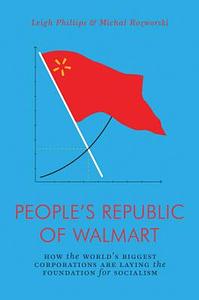Take a photo of a barcode or cover
reflective
medium-paced
I always side eye “socialist” books that spend the majority of the time complaining about communist regimes and martyring failed attempts ie Allende- i think it is accessible and thought provoking but at times economically illiterate
An interesting polemic, with lots of fun tidbits that made me want to research things further. I think the lack of bibliography/sourcing is a major knock against it, and makes it tough to take it seriously.
I also thought the first half or so (about amazon, Walmart, etc) left much to be desired. The arguments themselves felt unsatisfactorily in-between being simple and complex: the discussion of Amazon’s logistics felt like an overview from a business magazine, and I felt like I didn't get a great picture of how this "planning" actually works. Yet, they name-drop some esoteric jargon at times: I think the reader of this book could handle some more advanced discussion of the math/theory behind logistics/planning.
Similarly, I don't feel like enough space is taken describing an obvious counter-argument: "OK so Amazon/Walmart are vertically integrated. But people still buy stuff with limited money, how does the system work without scarcity/money?" They talk about it a bit, but I think this point is much less obvious than saying that Walmart/Amazon use logistics, which are basically planning (and which they discuss at length).
The writing itself (especially in the beginning), felt sloppy. A lot of stuff in the Sears section had me scratching my head, wondering how an editor didn’t catch it. For example, they drop some latin (or maybe it was French) phrases without context, and I had to look them up. However, there were times when they had to explain relatively simple concepts (like what a variable was), which I thought was strange. Who is the target audience for this book? Is it more for laymen, or is it more for people willing to dive a bit more into the weeds? I think either is fine-or even in-between, I'm sure the authors want it to be applicable for everyone-but they walk the line in an unsatisfying way, where some sections assume the audience is much more well-read than other sections.
The writers also can't help themselves from talking about the conditions of Amazon warehouses, and things of that nature, at length. I don't think the space they devote to it is worthwhile given the shortness of the book.
I thought the Soviet Union/Chile section was interesting. Someone more familiar with the history of the 20s-50s Soviet Union would get a lot less out of it than I did, but I think they provide an interesting focus on the history of planning here. Made me interested to research the topic further.
I also thought the first half or so (about amazon, Walmart, etc) left much to be desired. The arguments themselves felt unsatisfactorily in-between being simple and complex: the discussion of Amazon’s logistics felt like an overview from a business magazine, and I felt like I didn't get a great picture of how this "planning" actually works. Yet, they name-drop some esoteric jargon at times: I think the reader of this book could handle some more advanced discussion of the math/theory behind logistics/planning.
Similarly, I don't feel like enough space is taken describing an obvious counter-argument: "OK so Amazon/Walmart are vertically integrated. But people still buy stuff with limited money, how does the system work without scarcity/money?" They talk about it a bit, but I think this point is much less obvious than saying that Walmart/Amazon use logistics, which are basically planning (and which they discuss at length).
The writing itself (especially in the beginning), felt sloppy. A lot of stuff in the Sears section had me scratching my head, wondering how an editor didn’t catch it. For example, they drop some latin (or maybe it was French) phrases without context, and I had to look them up. However, there were times when they had to explain relatively simple concepts (like what a variable was), which I thought was strange. Who is the target audience for this book? Is it more for laymen, or is it more for people willing to dive a bit more into the weeds? I think either is fine-or even in-between, I'm sure the authors want it to be applicable for everyone-but they walk the line in an unsatisfying way, where some sections assume the audience is much more well-read than other sections.
The writers also can't help themselves from talking about the conditions of Amazon warehouses, and things of that nature, at length. I don't think the space they devote to it is worthwhile given the shortness of the book.
I thought the Soviet Union/Chile section was interesting. Someone more familiar with the history of the 20s-50s Soviet Union would get a lot less out of it than I did, but I think they provide an interesting focus on the history of planning here. Made me interested to research the topic further.
hopeful
informative
medium-paced
hopeful
informative
medium-paced
medium-paced
Great start in economics and very interesting!
informative
reflective
medium-paced
adventurous
inspiring
I've seen at least 4 lefttubers/breadtubers do a videoessay on this book. I'm still not sure how to feel about that, especially since this book ended up being a mess. Like footnotes/citations are the hyperlinks of a book, and this book has none & cites fictional books instead of nonfiction.
I originally gave this book 3.25 stars with the expectation there was a bibliography that would clarify their messy terminology, but then I found out the text copy doesn't have a bibliography either. So I cut off 2 stars because they cut us off a lot. I'll share more on their messy terminology when I'm back at my desk and able to put my journal notes together.
I agree with the premise because invisible handism is such a failure. You don't plan & you have no network then you starve to death. However, the evidence given had a lot of contradictions, and so I wouldn't give this book, especially since this is like math & such.
If there's anything this book pushes for more than (edit: 1.25, no more than 3.00 because it lost 2 stars for no bibliography) it's that it snitches what the dictatorship of the racial capitalist patriarchy already does & how the surveillance of the state plays into this
I originally gave this book 3.25 stars with the expectation there was a bibliography that would clarify their messy terminology, but then I found out the text copy doesn't have a bibliography either. So I cut off 2 stars because they cut us off a lot. I'll share more on their messy terminology when I'm back at my desk and able to put my journal notes together.
I agree with the premise because invisible handism is such a failure. You don't plan & you have no network then you starve to death. However, the evidence given had a lot of contradictions, and so I wouldn't give this book, especially since this is like math & such.
If there's anything this book pushes for more than (edit: 1.25, no more than 3.00 because it lost 2 stars for no bibliography) it's that it snitches what the dictatorship of the racial capitalist patriarchy already does & how the surveillance of the state plays into this
Graphic: Death, Racism, Sexism, Slavery, Suicide, Torture, Toxic relationship, Violence, Grief, Murder, Colonisation, War, Classism
Minor: Cannibalism
informative
medium-paced
A planned economy is also just big data. This is the very compelling argument at the core of this book. Real socialist economies faltered because computing technology wasn’t on par with these nations’ ambitions yet. When you look at companies like Walmart or Amazon, this popular argument makes a lot of sense. The book shows how these national and global enterprises are basically their own self-contained nation-like institutions. Both in scale and in the versaility of things they produce and distribute.
Our modern reality is: Big Data is better at predicting and steering the economy than the invisible hand of the market. Even capitalist companies know this, when they try their utmost to analyse their own big data for business advantages. The question is: Will we leave big data in the hand of companies and create a more authoritarian capitalism in which companies know everything about every person’s actions and desires? Or will we use this knowledge to create a more democratic social and economic system?
As long as the book engages in these questions, it’s a very interesting read. Despite its title it goes beyond the confines of Walmart and explains these concepts in a larger context. If anything, there is not enough Walmart, Amazon and the likes in here.
There are too many passages where the book goes through the basic history of neoliberalism and real socialism again. Yes, this historical background info relates directly to the core topic of the book, but it makes the overall impression remain quite unfocused. This could have been better if it focused more on its core aspects with even more depth.
Our modern reality is: Big Data is better at predicting and steering the economy than the invisible hand of the market. Even capitalist companies know this, when they try their utmost to analyse their own big data for business advantages. The question is: Will we leave big data in the hand of companies and create a more authoritarian capitalism in which companies know everything about every person’s actions and desires? Or will we use this knowledge to create a more democratic social and economic system?
As long as the book engages in these questions, it’s a very interesting read. Despite its title it goes beyond the confines of Walmart and explains these concepts in a larger context. If anything, there is not enough Walmart, Amazon and the likes in here.
There are too many passages where the book goes through the basic history of neoliberalism and real socialism again. Yes, this historical background info relates directly to the core topic of the book, but it makes the overall impression remain quite unfocused. This could have been better if it focused more on its core aspects with even more depth.
hopeful
informative
inspiring
medium-paced
Good outline of ideas. Not too much detail. Didn’t like that there weren’t sources for some of the things, but they do a good job of tracing the origins of certain ideas.


